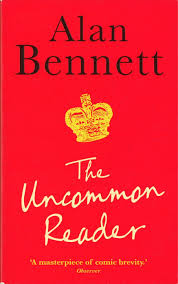 The Uncommon Reader
The Uncommon Reader
by Alan Bennett
Farrar, Straus and Giroux. 120 pages, $15.
SHORTLY AFTER FINISHING Alan Bennett’s novella, The Uncommon Reader, I began reading Terry Eagleton’s After Theory (2004) and came upon the following passage, in which Eagleton, discussing the role of money in the current social order, uses one of his characteristically inventive and arresting similes to amplify his point: “[Money] is infinitely adaptive to the most bizarre or extremist of situations, and like the Queen has no opinions of its own about anything.” Eagleton’s comparison hinges on a generally accepted belief about Britain’s monarch. Bennett, accepting that same truism, imagines a fictional Queen who proves it wrong and develops her own opinions about a whole range of things.
How does Bennett’s Queen reach this state? She begins to read. Bennett drops us into his tale in medias res, during a state dinner at Buckingham Palace for the French president. The Queen has already begun her explorations of literature and is becoming intellectually curious, so she uses her time with the president to inquire about Jean Genet. The president’s interest and attentiveness are feigned; the Queen’s are not. This new dynamic, so strange and surprising to the suddenly uncomfortable president, is rendered with deft economy by Bennett and sets the stage for the drama to come.
But before progressing to those larger consequences, Bennett’s omniscient narrator shows us the internal changes that give rise to the Queen’s newly broadened perspective. Since his subject is one who is painfully conscious, through long habit, of how she herself is observed, indeed who refers to herself in the third person, telling this story as a first-person narrative would make little sense. And so we witness from an omniscient perspective the Queen’s transformation in a series of incremental, seemingly inconsequential choices that nevertheless have dramatic consequences.
It begins quite by chance and unfolds gradually, after the Queen stumbles upon the bookmobile that regularly visits for the convenience of the palace staff. Chasing after one of her dogs, she enters the traveling library, makes conversation with the librarian and the lone patron, Norman, an awkward, homely young man who serves as one of the palace’s kitchen servants and who, we learn later, is gay. Not at all inclined to borrow a book but feeling duty-bound to do so, the Queen selects an Ivy Compton-Burnett novel and later labors through it out of that same sense of duty. Resigned to keep up appearances, she’s well aware that she’s out of her element in the world of books. “One had no preferences,” she reflects of herself. “Her job was to take an interest, not to be interested herself. And besides, reading wasn’t doing. She was a doer.”
Upon returning the Compton-Burnett book, the Queen again feels compelled to borrow something, selecting this time Nancy Mitford’s The Pursuit of Love. It proves a momentous choice, because the Queen gets lost in the book and soon begins regular visits to the bookmobile, where she receives recommendations from Norman and begins to befriend the young man. Before long, the Queen is reborn as a reader: “What she was finding also was how one book led to another, doors kept opening wherever she turned and the days weren’t long enough for the reading she wanted to do.” She begins to sneak away with books, even at the expense of her official duties, and her friendship with Norman grows. Her new habit, not to mention her attentiveness to a servant as low in the pecking order as Norman, generates a less than positive response within the palace and beyond.
The difficulties engendered by her reading are more than logistical. The Queen finds through reading a world where “she could go unrecognized,” and the more she explores it, the more sensitive, curious, emotive, and even activist, she becomes. To those around her, this new “sensibility” is a threat, an unsettling departure from the reserved, contained personage they’ve become accustomed to. Some even mistake the change for nascent senility. Her private secretary and her equerry each takes it upon himself to discourage the Queen’s reading. The bookmobile is discontinued. Norman is sent away. But these machinations prove ineffective and come too late; and the story moves to an amusing and surprising conclusion.
As much as The Uncommon Reader is, on one level, a very profound and even moving story of one human being’s growth into authenticity, it is even more a wonderfully entertaining satire of institutions, class, and the grand theatre of world politics. (American readers might wonder, too, if Bennett is offering a sly commentary on one other famously un-intellectual Western head of state.) Bennett is an esteemed playwright and an accomplished comedic writer, and this slim book is rich, rewarding, and memorable.
____________________________________________________________________
Jim Nawrocki, a frequent contributor to this publication, is a freelance writer based in San Francisco.





